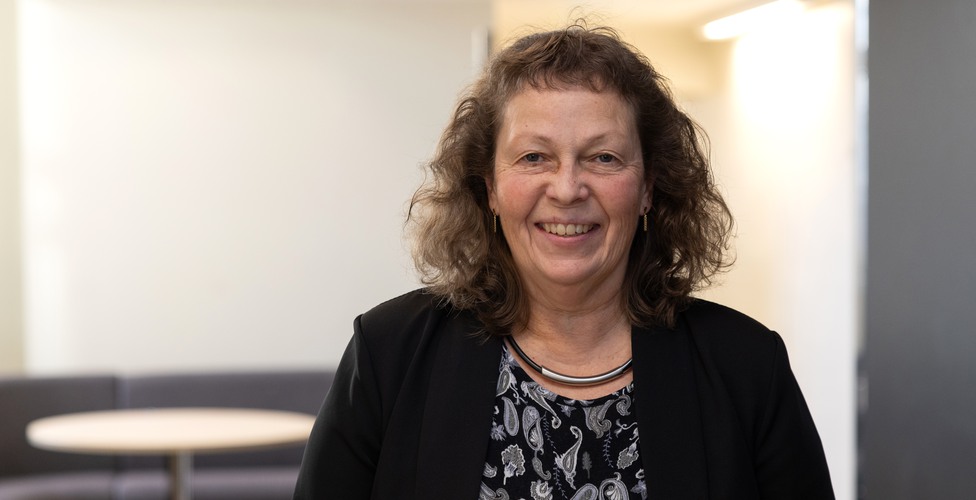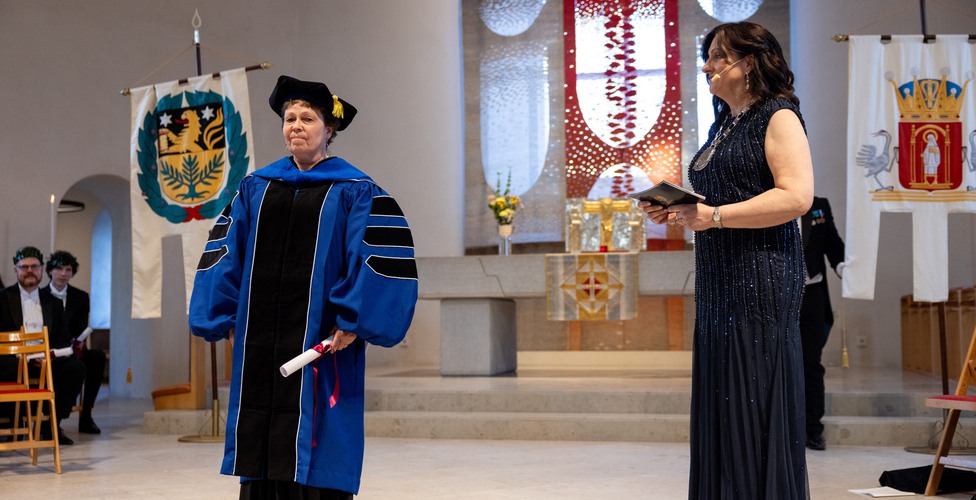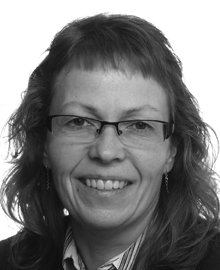Catharina Gillsjö has made an academic journey that spans the Atlantic – from nursing studies in Skövde to doing her doctorate in the USA. She is a well-known name at the University of Skövde and as a newly appointed Professor of Nursing she continues to drive research forward with a focus on the health of older persons through innovation and collaboration.

Catharina Gillsjö was born and raised in Töreboda, Skaraborg. Despite a great interest in nursing, she chose to study a three-year social science course at Vadsbogymnasiet in Mariestad, supplemented shortly afterwards with a one-year course in nursing and became a registered nurse. She then moved to Linköping, studied to be a nurse and started working at the University hospital in Linköping at the ward for burn injuries.
– It was a good education at Linköping University with problem-based learning with both doctors, physical-and occupational therapists. Those were interesting and educational years, says Catharina.
Then she moved back to Töreboda, started a family, and began working as a nurse in a special housing facility for older persons. She soon became the unit manager at one unit. After working for just over 10 years in a special housing, she chose to start studying to become a district nurse at the University of Skövde. Her bachelor's thesis – "Home care, the only chance for us to live together" is available as a report in the Digital Scientific Archive. Catharina then continued with courses at Sahlgrenska Academy and received a master's degree in nursing in 2003. Subsequent two summers, she studied master's courses with teachers from the University of Rhode Island (URI), USA, which were organized in collaboration with the University of Skövde. Catharina also started studying the Family Nurse Practitioner training program with a specialization in gerontology and geriatrics at URI with courses, theory and clinical training (VFU) in both Sweden and the USA. The collaboration with URI also continued in a PhD Joint Program in Nursing with courses in Sweden and the USA, of which one year consisted of postgraduate studies on site at URI. Catharina was offered a position as a doctoral student and accepted.
New experiences in vulnerable areas
Catharina went to the USA with two doctoral students and a daughter of one of the doctoral students to study doctoral courses and work on her thesis during the academic year 2006/2007. They rented a beach house in the town of Narragansett. During her time in the USA, she also continued her studies in the Family Nurse Practitioner master's program with a Master of Science in Nursing.
– It was a fun time but at the same time very challenging. We took three courses per semester, so there was a lot of focus on theory-heavy research studies. I also did both theoretical courses and VFU at a clinic for children of uninsured teenage mothers in Providence, a socio-economically disadvantaged area. I got to witness difficult social conditions and get up close to diseases that we are not used to seeing in Sweden, says Catharina.
At the clinic, she had to do physical checks and assessments that are carried out by doctors in Sweden. The work involved close collaboration with the counselor at the clinic when there was a need to find temporary accommodation for vulnerable women and distribution of food stamps.
– The girls who came to the clinic were only around 13 years old and up. Often it was grandparents who came along to support the mother or came with the children when the parents were in prison or in treatment centers. Many of the children lived in misery. I also saw how companies contributed to children not receiving optimal nutrition by providing sweetened milk substitutes, she continues.
Catharina Gillsjö also did VFU in the area of care for older persons, both in institutions and in home care. She defended her thesis at the University of Rhode Island in 2012 and received a doctorate in Nursing Science with the thesis “Older Adults´ Conceptions of Home and Experiences of Living with Long-term Musculoskeletal Pain at Home”. She remains a Graduate Adjunct Faculty at URI and has traveled back to Rhode Island on several occasions for research collaborations but also taught in nursing in bachelor and graduate education. She has also have had the role as main supervisor for a doctoral student with supervision digitally between physical visits to URI.
A collaborative arena for research and innovation
Catharina's academic journey has been long. She is a trained nurse, district nurse and Family Nurse Practitioner with specialization in gerontology and geriatrics. At the University of Skövde, she has held positions as program manager, member of the University Board and is now a member of the Faculty Board. At the academic ceremony this spring, she was installed as a professor of nursing. Catharina's research has a starting point in the subject of nursing and the doctoral study area Health in the Digital Society within health sciences. Much of her scientific work is used by both students and doctoral students.
The interest and commitment to the health of older persons has been a driving force in the research and in what became the University's collaborative arena Skaraborgs Health Technology Center (SHC). Skaraborgs innovative environments (SIM2020), which was a collaboration between the University, Skaraborgs Kommunalförbund and Västra Götaland Region with EU funds, and the EU project Baltsenior laid the foundation for SHC. In the arena, which is today financed by the Municipality of Skövde, business, the public sector, academia, organizations, innovation actors and civil society collaborate on innovation, research and education to create innovative solutions, safe and secure environments, primarily for older persons.
The demographic aspect with a decreasing proportion of the working population in relation to the proportion of older persons in society and a transition to close and integrated care at home has created a need and use of digital solutions in daily life. Aging in the digital society and entail both safety and security but also vulnerability, something that should be researched more. In SHC, Catharina and other research colleagues work interdisciplinary and on projects around social assistant robots, mobile security alarms with GPS function, evaluation of alarm systems with safety sensors and simulation in age suit. They also test innovations, such as bed sensors and fall protection for walkers. The collaboration arena contributes to increased understanding for older persons, and last year, in addition to the University's own students, had about 700 external visitors from schools, municipalities and organizations who participated in about fifty activities.

Catharina Gillsjö together with Vice-Chancellor Muriel Beser Hugosson at this year's Academic Ceremony.
The Future at the University
A widespread problem in society and also in healthcare is ageism. Through simulation in a so-called "age suit ", students and other visitors, primarily from the sector health- and social care, get to experience how aging and health problems affect daily life by being a persona with various health problems. This innovation is a training element that Catharina developed with a colleague. The training element is part of nursing and specialist nursing education and each simulation session is followed by a reflection seminar.
– This training element creates more understanding of the health problems that older person can have and how it can influence daily life. It can be anything from hemiparesis, chronic obstructive lung disease, pain to visual impairment and hearing loss. The simulation gives our students increased insight and understanding, they become better equipped to care for older persons. They also gain insight into the importance of the environment when it comes to aging and living with health problems, says Catharina.
In the future, Catharina wants to continue to delve into the health and well-being of older persons, and improvement of working environment for health and social care providers with the support of digital solutions. One area of research is projects using Reflective STRENGTH-Giving Dialogue in healthcare, a method that Catharina developed together with a colleague based on results in their dissertations. There are also thoughts about developing “older person avatars” that can be used in the digital twin of the accessibility-adapted apartment in SHC. Additional projects that are in the planning phase or start-up include, in addition to avatars, humanoid robots and prediction of diminished health.
In addition to the SHC collaborative arena, Catharina is involved in the education for advanced specialist nurses (APN) at both local and national levels. She is the only professor in Sweden who has that particular profession and is involved in contexts where the education is discussed nationally. Catharina recently participated in a national hearing organized by the Swedish Nursing Association regarding the education at Karolinska Institutet in which the new role and education was presented and discussed
Implementation of advanced specialist nurse as a role with a protected professional title is a concern in today's healthcare for increased accessibility, quality and continuity of healthcare. One area that is particularly highlighted is the need for increased competence in medicine and nursing within primary municipal healthcare, especially in view of the work on the transition to close integrated care with increased advanced care in the home. This provides a space between healthcare providers that needs to be bridged and that can be filled by implementing Advanced Specialist Nurse in primary municipal activities.

